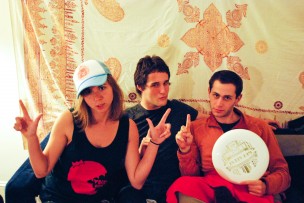
If you wear glasses but put in contacts to play sports, have FOMO, or just don’t fit in, you should play Ultimate, according to the recruiting signs for Wesleyan Ultimate Frisbee.
Ultimate Frisbee is having a particularly intense moment on campus, according to Noam Sandweiss-Back ’15. Sandweiss-Back is one of the team’s captains, along with Isaac Pollan ’15 and Peter Sohmer ’16. All of them are part of Wesleyan’s all-male Ultimate Frisbee team, which is called Nietzsch Factor. Nietzsch Factor is one of three Ultimate Frisbee teams on campus. The other two are Vicious Circles, which is all-female and captained by Katherine Gibbel ’15 and Lucy Salwen ’17, and Throw Culture, which is co-ed and led by Max Owen-Dunow ’15, Jesse Lieman-Sifry ’15, Emily Schwed ’15, and Tavo True-Alcala ’15.
Throw Culture will be playing in a tournament this weekend at Green Mountain College. This team, perhaps best-known for its members’ love of jean shorts and Pabst Blue Ribbon, is the newest addition to the Wesleyan Ultimate Frisbee scene.
Vicious Circles participated in a tournament at Brown this last weekend, which was the first of the year for the team. It will compete in a second tournament later this fall, its last for the semester.
“Fall is our off-season,” Gibbel said.
Sandweiss-Back agreed that fall is a time for rebuilding rather than competing, especially since Nietzsch Factor recently lost several members. The captains have been working to create a new team dynamic this fall. Sandweiss-Back pointed out that the practice schedule is just as grueling in the fall as it is in the spring, despite the fact that the team only competes in tournaments in the spring. For Nietzsch Factor, developing a strong team dynamic is just as important as the competitive element of Ultimate.
Several players spoke about the differences between Wesleyan’s three Ultimate Frisbee teams.
“I’d say it’s mostly gender identification,” Gibbel said. “There are other differences, but the basic is that Throw is co-ed and Vicious is all women. And Vicious has drills.”
Though the teams’ gender identifications are the most obvious distinctions between them, they also take different approaches to the game of Ultimate itself.
“The two single-gender teams came first, and Throw Culture was formed in that space of the people who wanted a less formal, less competitive, more fuck-around-when-you-feel-like-it kind of frisbee team, and I think that divide still persists to some extent,” Owen-Dunow said. “Throw has always been a sort of chiller option.”
Throw Culture may be known for its welcoming and relaxed spirit, but the team makes competition a priority. A tournament with co-ed teams from other schools was supposed to take place at Wesleyan last weekend, but the plans fell apart at the last minute. As a result, the team will participate in only three tournaments this fall.
The relationship between the three Ultimate teams has a fraught history. For a long time, the three teams felt competitive toward one another. However, members of all three teams were quick to point out that the groups are getting along very well this year, in large part due to the friendship between Gibbel, Owen-Dunow, and Sandweiss-Back.
For all three teams, the Ultimate community is what keeps them around. Frisbee players at Wesleyan feel a strong sense of kinship both with the members of the three University teams and with the larger collegiate Ultimate community. Gibbel attributes this to Ultimate’s tendency to attract a certain type of person.
“People who [play Ultimate] are really interested in sports and being competitive and athletic, but also a lot calmer and friendlier than [those who play] other sports I’ve done in the past,” Gibbel said.
The teams attract players with varying levels of Ultimate Frisbee experience. Many members of Throw Culture did not play Ultimate before joining. In contrast, Nietzsch Factor’s new roster consists entirely of people who have played before. Vicious Circles tends to attract a mix of the two, but whether or not they have played Ultimate before, most of the members have experience with competitive sports, especially soccer and basketball. Despite the players’ diverse levels of background with the sport, all are willing to commit to the intense team schedule.
When Gibbel played Ultimate Frisbee for the first time during her first year at Wesleyan, one aspect of the game that she found especially engaging was the pervasive notion of “Spirit of the Game.” The philosophy, which has been a crucial aspect of Ultimate since its invention in the late 1960s, invokes the honor system. Players call their own fouls; there is no referee.
“For me, ‘Spirit of the Game’ is about a sort of camaraderie, not just with your own team but with other teams, and a sense of respect, a sense of character and integrity, that you want to bring to the field,” Gibbel said. “People are competitive, obviously; people want to excel and do well, but at the end of the day it’s about having fun and making sure it’s a great time for everyone.”
Owen-Dunow agreed that a peaceful approach to the game is part of Ultimate’s appeal .
“What separates Ultimate from a lot of other sports I’ve played, especially in high school, is that even at a competitive level of play there’s really a focus on having fun,” he said. “In collegiate Frisbee, it’s not uncommon to mingle with the teams on the sidelines, and everyone is applauding great performances on the other team.”
Correction: This article previously misspelled Nietszch Factor as “Nietszche Factor.” It has been updated with the correct spelling.



Leave a Reply